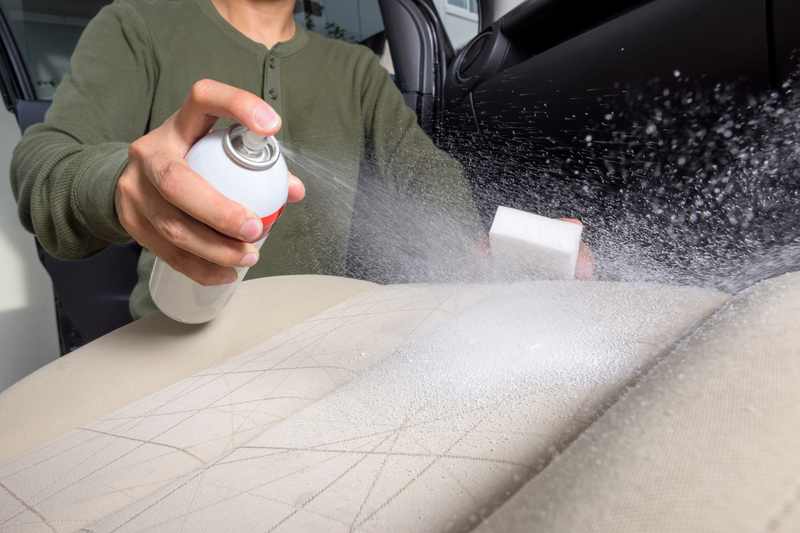Combat Damp Smells With These Pro Tips
Posted on 29/09/2025
Combat Damp Smells With These Pro Tips for a Fresher Home
Damp odors can linger in homes, making spaces feel unclean and unwelcoming. Whether your basement, bathroom, or living room is affected, combatting damp smells is essential for both your comfort and your health. In this in-depth guide, you'll uncover pro tips to fight off musty household odors, keep your spaces fresh, and prevent the return of those unpleasant scents. Read on to discover the secrets of getting rid of damp smells once and for all.

Understanding the Source of Damp Smells
Before you can effectively eliminate musty odors, it's crucial to pinpoint their origin. Damp smells typically stem from excess moisture, which creates the perfect environment for mold and mildew to thrive. Laundry rooms, closets, crawl spaces, and unventilated bathrooms are common hotspots. Not only do damp problems smell bad, but they can also damage your home's structure and trigger respiratory issues.
Common Causes of Damp Odors
- Leaking pipes or roofs
- Poor ventilation in bathrooms and kitchens
- Wet clothes or towels left unattended
- Basements prone to flooding or condensation
- Neglected spills or water damage
Recognizing and addressing these sources is the first step toward getting rid of damp smells for good.
Pro Tips to Combat Damp Odors from the Experts
1. Improve Ventilation Throughout Your Home
One of the most effective ways to tackle musty odors is by increasing air circulation. A well-ventilated house doesn't just smell better; it also reduces moisture and keeps mold and mildew at bay.
- Open windows and doors as often as possible.
- Install or upgrade extractor fans in bathrooms and kitchens.
- Use ceiling fans to circulate air, especially during humid months.
- Position furniture away from walls to encourage airflow.
Tip: Consider installing a whole-house ventilation system for enduring results!
2. Utilize Dehumidifiers and Moisture Absorbers
Dehumidifiers are a game-changer for anyone dealing with persistent damp smells. By pulling excess moisture from the air, these devices make it tough for mold and mildew to grow.
- Place a dehumidifier in chronically damp areas like basements and bathrooms.
- Check and empty the water reservoir regularly to maintain effectiveness.
- Try moisture absorber products (like silica gel or activated charcoal) in smaller spaces such as closets or under sinks.
Pro Tip: In addition to mechanical dehumidifiers, houseplants such as peace lilies or Boston ferns naturally absorb humidity and add a touch of greenery to your home.
3. Thoroughly Clean and Disinfect Affected Areas
Once the moisture issue is under control, it's time to address lingering odors. Deep cleaning surfaces where mold and dampness have occurred is essential.
- Wash all fabrics (curtains, cushions, rugs) using a mix of baking soda and white vinegar to neutralize odors.
- Scrub tiles, grout, and hard surfaces with a bleach solution or anti-mildew spray.
- For walls and ceilings, opt for specialized mold-removal products.
- Don't forget to clean air-conditioning units, ducts, and filters, as they can harbor hidden mold.
*Remember: Always wear gloves and ensure good ventilation when using strong cleaning agents.
4. Address Structural Issues Promptly
Even the best odor-fighting tricks won't work if underlying structural issues persist. To fully combat damp smells, locate and repair:
- Leaky roofs or gutters
- Cracked foundations or basement walls
- Defective window seals
- Leaking pipes or appliances
Not only will these repairs help you eliminate musty odors, but they will also protect your property in the long run.
5. Use Natural and Commercial Odor Neutralizers
After you've addressed moisture and cleaned up, it's time to freshen your home's ambiance. Try these powerful odor-fighting solutions:
- Baking soda: Sprinkle over carpets and upholstery, leave for a few hours, then vacuum.
- White vinegar: Place bowls of vinegar in musty rooms overnight to absorb and neutralize odors.
- Activated charcoal: Naturally soaks up unpleasant aromas. Replace every couple of months.
- Commercial odor neutralizers: For persistent issues, products specifically designed to remove damp smells can be very effective.
Insider's Tip: Freshly cut lemons or essential oil diffusers can add a clean fragrance to previously dank rooms.
6. Rethink Flooring and Wall Coverings
Carpets and certain wall coverings can trap moisture, keeping musty odors around. If you've struggled to completely eliminate damp smells, consider:
- Switching from carpets to tile, vinyl, or hard-surface floors in high-moisture areas
- Opting for mold-resistant paints and wall treatments
- Promptly replacing any water-damaged drywall or paneling
Floors and walls that resist water and mold are essential in keeping odors at bay--especially in basements, bathrooms, and kitchens.
Long-Term Strategies to Prevent Damp and Musty Smells
Wiping out odors is only half the battle. If you want your home to stay fresh and odor-free, preventive maintenance is key. Here's what the pros recommend:
Regular Inspections and Maintenance
- Check for leaks around pipes, windows, and roofs at least twice each year.
- Keep gutters and downspouts clear of debris to direct water safely away from your foundation.
- Test your sump pump or drainage systems before the rainy season hits.
Maintain Ideal Humidity Levels
- Use a hygrometer to monitor indoor humidity (aim for 30-50%).
- Run dehumidifiers or air conditioners as needed, especially in humid climates.
- Hang damp laundry outside rather than indoors when possible.
Adopt Odor-Fighting Cleaning Regimens
- Vacuum and dust regularly, especially in corners where moisture can accumulate.
- Wash and routinely air out linens, bedding, and curtains.
- Use cleaning products with mold-fighting capabilities after any water spills or leaks.
Being proactive now means fewer headaches later!
Frequently Asked Questions: Damp Smells and Musty Odors
Why do damp smells persist even after cleaning?
Lingering odors often indicate underlying moisture issues that haven't been fully resolved. Sometimes, moisture may be trapped behind walls or under floorboards. In other situations, spores from mold or mildew continue to thrive unseen. Comprehensive moisture control combined with deep cleaning will yield the best results.
Are damp, musty odors dangerous?
While musty smells themselves are unpleasant rather than harmful, they often point to mold or mildew growth. Prolonged exposure to spores can trigger allergies and respiratory problems--especially in children, the elderly, and those with weakened immune systems. It's wise to address the issue promptly.
What if home remedies don't eliminate the smell?
If DIY solutions and routine cleaning don't combat damp smells effectively, consider bringing in specialist help. Professional mold remediation teams can identify hidden issues, test air quality, and treat your home using advanced equipment.

The Final Word: Win the War Against Damp and Musty Odors
No one wants a home with lingering, unpleasant smells. With the right knowledge and regular maintenance, you can keep your space smelling clean, healthy, and inviting. By identifying sources, boosting ventilation, using moisture control tools, deep cleaning, and maintaining vigilance, you'll be well on your way to eliminating damp smells for good.
Don't just mask the odor--tackle the root causes and embrace a fresher, healthier home lifestyle today!
Related Resources
- EPA Guide to Mold & Moisture
- WebMD: Mold, Mildew, and Your Health
- Family Handyman: 20 Ways to Rid Your Home of Musty Smells
Armed with these pro tips, you have all you need to combat damp smells, prevent their return, and enjoy a fresher home for years to come.
Latest Posts
Banish Grease for Good: Master the Art of Cleaning Enamel Oven Trays
Combat Damp Smells With These Pro Tips
Unlock Professional Car Cleaning Secrets Today
Efficient Tips to Eclipse Household Cleaning
Embrace Fresh Beginnings: Tackle Cleanliness with Our Spring Deep Clean Guide



